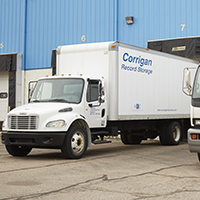As a business owner, you probably have several operational processes in place in an effort to maintain organization, grow your company, and keep all goals on track.
So, what’s wrong with files piling up? As you collect more records over time, you eventually need to decide how to properly manage these or you will be faced with security concerns and general clutter, neither are ideal situations to be in. With that said, the decision as to what documents should be stored and which are irrelevant and can be securely shredded<>, isn’t always an easy one to make. In fact, many business owners hesitate to shred documents because they are concerned with compliance laws. All of this hesitation leads to a large amount of files to deal with, which in itself is a security risk if not managed properly.
So how do you decide what records to store and what to shred?
Managing Tax Records
Being confused with what to do with old tax records is common and an area that can be confusing for business owners. While tax records indeed include highly confidential information, unless they are required for assessment purposes, they do not need to be stored longer than legally required.
The Internal Revenue Service recommends that any tax records documenting expenses, income, credits or deductions, should be securely stored until the period of limitations for that tax has expired. While many tax records fall under a seven-year storage rule, not all tax records need to be stored this long; it really depends on the specific type of tax record. That said, any tax-related file that reveals income or expenses should be carefully stored in the event you are audited down the road.
At any rate, when in doubt, it’s always wise to store old tax records off-site through a professional records management company. In doing so, you can rest assured that these files will remain protected under the highest level of security measures, until you are ready to retrieve or shred them. Save space in your office and have peace of mind in knowing exactly where your tax records are located without having to siffle through endless files. Off-site records storage is convenient, secure, and cost-effective for your business.
Managing All Other Business Records
Aside from tax records, there are several other types of documents that are circulated throughout most companies, to consider as well. So what do you do with these non-tax records?
Employment applications, utility documents, and bank statements, should be securely stored for a three year period; as a rough guideline. In reference to more unique records such as instructions and warranties; these should be properly stored for the duration of the product’s lifespan. Insurance policies should be kept for the life of the policy, and finally, you should hang onto any vehicle records until the car is sold and under a new ownership.
Reach Out to Corrigan Records Today for Guidance
At Corrigan Record Storage, We have 30 years of experience in records storage, and work with a variety of businesses, providing document management solutions that include records storage and document shredding services. Our record storage services include a highly secure facility, 24/7 access, and two-hour rush delivery. Your important tax records and general business records will always be at your fingertips, if and when you wish to retrieve them again. On the other hand, once these records have reached the end of their lifecycle, we provide secure document destruction services following storage, if you so wish.
Simply reach out to our team and we’ll be happy to discuss with you how we can meet your records storage needs. Why worry about the status of your records when you don’t have to!




